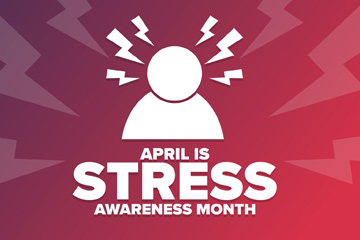The feeling of emotional and physical tension which occurs due to an event or thought and makes you feel angry, nervous or frustrated is known as stress. Everyone experiences stress at some point in their life and this is considered quite normal. However, if it persists for a long time, stress can cause serious physical and mental health issues. That’s why it is very important to learn how to manage stress. April is observed as Stress Awareness Month to increase public awareness about the causes of stress and how to combat it.
Since 1992, Stress Awareness Month – designated by The Health Resource Network – has been an ongoing campaign of awareness and education. It is a national, cooperative effort that reminds us to pay attention to our health. This observance is aimed to inform people about the dangers of stress, successful coping strategies, and harmful misconceptions about the condition that are prevalent in society. Today, many Americans experience prolonged and elevated stress levels. According to the American Psychological Association, the significant sources of stress found in the lives of majority adults these days are due to the coronavirus pandemic (80%) and political unrest around the country (74%). To help people cope up with the situation, this year, healthcare professionals and health promotion experts across the country will join forces to increase public awareness about both the causes and cures for the modern stress epidemic.
Handling stress can be different for everyone. There are different types of stress and techniques to manage the condition and some techniques might work for some people whereas they may not be effective for others. Finding and following the right technique can help you manage stress effectively. Here are some strategies that you can follow to keep stress at bay or to recover from the condition:
- Get a Good Night’s Sleep: Lack of sleep is one of the major reasons for stress. Focus on getting a good night’s sleep – at least 6-8 hours is recommended. Sleep de-stresses and recharges your system.
- Avoid Unhealthy Coping Mechanisms: Avoid or quit unhealthy coping mechanisms such as alcohol, smoking and drugs. The stimulants in these mechanisms – like caffeine and nicotine – can actually aggravate anxiety and trigger panic attacks. Instead, drink lots of distilled water, herbal teas, or diluted natural fresh juices to keep yourself hydrated and cope with stress.
- Exercise: Exercising not only keeps your body healthy, it is also a great stress reliever. Make exercise a part of your daily routine. Activities like taking a brisk walk in the fresh air, walking, swimming and yoga are some good options to de-stress.
- Spend Time with Friends and Family: Having strong social relationships with friends and family may help you get through stressful times and lower your risk of anxiety. Being part of a friend or family network gives you a sense of belonging and self-worth, and can help you in tough times. (healthline.com)
- Try a Relaxation Technique: To clear the mind, body, and soul from stress and anxiety try various relaxation techniques such as meditation, tai chi, yoga, and deep breathing.
- Eat Healthy: To cope with stress, you need to have a well-nourished body and for that you need to be mindful of what you eat. Eat balanced meals as they are important to keep your energy levels up and your mind clear throughout the day. Avoid caffeine and sugary foods and drinks.
- Laugh: Several studies say that laughing releases “happiness hormones” which decreases cortisol and adrenaline levels, and reduces the level of stress hormones. Laughing also relieves tension by relaxing your muscles. Therefore, find the humor in everyday life, spend time with funny friends or watch a comedy show to help relieve stress.
- Avoid the Stressors: Identify the sources of stress in your life and avoid or manage it. If it’s a person who stresses you out, try to limit the time you spend with that person. If you can’t avoid a stressful situation, try to alter it or adapt to it.
- Express your Feelings: Suppressing your feelings can cause resentment to build and elevate anxiety. So, be more assertive and communicate your concerns in an open and respectful way.
- Appreciate Yourself: Do your best and be proud of your achievements.
- Maintain a Positive Attitude: Try to focus on things that you can do well and make an effort to replace negative thoughts with positive ones. There are some things that you cannot change, so learn how to respond in the right way.
Follow these strategies and control your stress. However, even after following these tips your symptoms continue, consider seeking medical advice. A professional therapist can help you identify the sources of your stress and provide the right therapy to address it.
